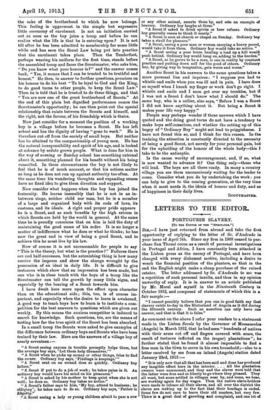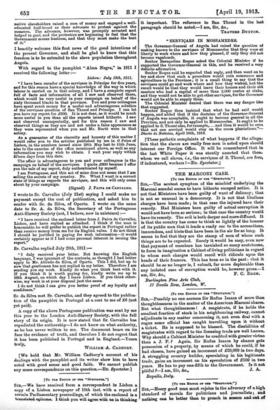LETTERS TO THE EDITOR.
PORTUGUESE SLAVERY.
[To THY EDITOR ON THE " BrEcTITos.-1 SIEt,—I have just returned from abroad and take the first opportunity of replying to the letter of Sr. d'Andrade in your issue of April 5th. Since my firm in 1908 ceased to pur- chase San Thome cocoa as a result of personal investigations in Portugal and Africa, I have constantly been attacked in
the Lisbon press as the enemy of Portugal, and have been charged with every dishonest motive, including a desire to wreck the financial position of the planters, so that in the end the English might make a cheap purchase of the ruined estates. The letter addressed by Sr. d'Andrade to me was a repetition of such personal insults, and thus in my opinion
unworthy of reply. It is in answer to an article published by Mr. Morel and myself in the Nineteenth Century in October 1912, and composed of statements of which this is a fair sample :— "I cannot possibly believe that you can in good faith say that slavery exists to-day in the Hinterland of Angola as it did during the fifteenth century. Such an assertion can only have one answer, and that is that it is false."
As comment on the above I refer your readers to a statement made in the Lisbon Seculo by the Governor of Mossamedes (Angola) in March 1912, that he had seen "hundreds of natives with their arms cut off and fingers covered with scars, the result of tortures inflicted on the (sugar) plantations "; he
further stated that he found it almost impossible to find a free man in the town to serve in his own household ;—also to a letter received by me from an inland (Angola) station dated January 23rd, 1913 :—
"It is only now that all that has been said and done has produced any tangible effect here in the interior. . . . All the plantation owners were summoned, and they and the slaves were told that the latter were free and at liberty to go where they pleased. They all went, but some settled in villages near by, and some, we hear, are working again for day wages. Then the native slave-holdera were made to release all their slaves, and all over the district the slaves are waking up to the fact that their bondage is ended. Some few do not care to leave their old masters, but very few. There is a great deal of growling and complaint, and one lot of native slaveholders raised a sum of money and engaged a well- educated half-breed as their advocate to protest against the measure. The advocate, however, was promptly arrested and lodged in gaol, and the protesters are beginning to feel that the Government means business, and that they must make the best of it."
I heartily welcome this first news of the good intentions of the present Governor, and shall be glad to know that this freedom is to be extended to the slave population throughout Angola.
With regard to the pamphlet "Alma Negra," in 1911 I received the following letter Lisbon : .Tuly Ma, 1911.
"I have been curador of the servicaes in Principe for five years, and for this reason have a special knowledge of the way in which labour is carried on in that colony, and I have a complete report full of facts and information of all I saw and observed there, which would be very useful in your campaign on behalf of the sixty thousand blacks in that. province. You and your colleagues have spent much money for a useful and advantageous solution of the servicaes question of San Thome and Principe. I can let you have my report for £200. It is not dear, as it would be much more useful to you than all the reports issued hitherto. I saw and observed unsuspectedly, and for this reason I saw and observed things as they are and not under a false appearance as they were represented when you and Mr. Burtt were in that colony.
As a guarantee of the sincerity and honesty of this matter I would refer you to the articles published by me in 0 Poise of Lisbon, in the numbers issued since 20th May last to 15th June, also to the exercise of the office mentioned above, as well as any information you may wish to obtain. I wait your reply within fifteen days from this date.
The affair is advantageous to you and your co/leagues in the campaign on behalf of the servicaes. I quote 4200 because I offer you the sale of my report, duly authenticated by myself.
I am Portuguese, and this act of mine does not mean that I am selling the secrets of my country. No. What I want is a correct state of things as regards the servicaes, and this will only come about by your campaign. (Signed) J. PAIVA DE CA_RVALHO.
I wrote to Sr. Carvalho (July 218t) saying I could make no payment except the cost of publication, and asked him to
confer with Sr. da Silva, of Oporto. I wrote on the same date to Sr. A. da Silva, the Secretary of the Portuguese Anti-Slavery Society (not, I believe, now in existence) :— "I have received the enclosed letter from J. Paiva do Carvalho, Lisbon, and have replied as attached. I think if the man is honourable he will prefer to publish the report in Portugal rather than receive money from me for its English value. I do not think I should be justified in paying for such information—it would certainly appear as if I had seine personal interest in issuing the report"
Sr. Carvalho replied July 29th, 1911 :—
"I duly received your letter. Not knowing the English language, I was ignorant of the contents, so thought I had better apply to Mr. Alfredo da Silva, of Oporto. This I did, but up to now that gentleman has not replied to my letter. Therefore I am sending you my work. Kindly do what you think best with it. If you think it is worth paying for, kindly write me up to 10th August, on which day I leave Lisbon. If you think other- wise, my work is at your disposal just the same.
I do not think I can give you better proof of ray loyalty and confidence."
Sr. da Silva met Sr. Carvallio, and they agreed to the publica- tion of the pamphlet in Portugal at a cost to me of £6 (not yet paid).
A copy of the above Portuguese publication was sent by me this year to the London Anti-Slavery Society, with the full story of its origin. It is now stated that Sr. Carvalho has repudiated the authorship—I do not know on what authority, as he has never written to me. The document bears on its face the evidence of truth, and therefore I do not regret that it has been published in Portugal and in England.—Yours truly, WILLIAM A. CADBURY.
[We bold that Mr. William Cadbury's account of his dealings with the pamphlet and its writer show him to have acted with good sense and good faith. We cannot publish any more correspondence on this question.—ED. Spectator.]











































 Previous page
Previous page